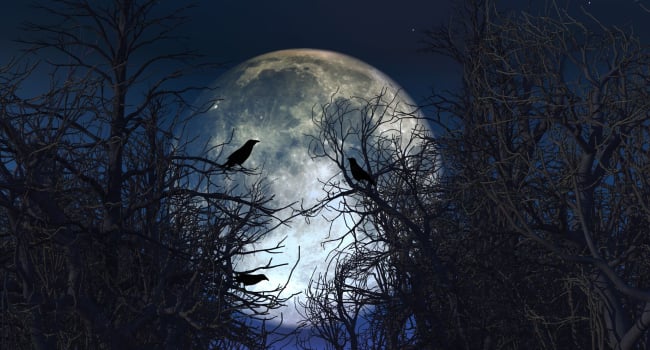
Wolf Moon: When is the first full moon of a leap year expected and how will it affect people's well-being?
The first full moon of 2024 is expected on January 25: on the night of January 26, the Moon in the sky will take a perfectly round shape and will appear that way for several more days. People call the first full moon of the year the Wolf Moon.
Could this full moon affect how people feel or behave? Or is it just a myth?
Why Wolf Moon?
In fact, Wolf Moon is far from the only name for this phenomenon. There are others: Quiet Moon, Old Moon, Cold Moon, Hay Moon, Deer Moon, Storm Moon, Honey Moon and so on.
Why "Wolf"? As it turns out, everything is simple: at this time, wolves usually become more active and come out to howl at the moon more often.
Impact on well-being: truth or myth?
You can often hear the opinion that during the full moon people become more restless, irritable, anxious, and sleep worse. However, there is no scientific evidence to support this. Evidence from modern science indicates that the belief that the phases of the moon can somehow influence the health, well-being and well-being of people is only part of folklore, albeit rooted in various cultures.
- Moon phases and human behavior. Scientific research has failed to provide consistent and convincing evidence for claims that lunar phases can influence human behavior and, for example, increase hospitalizations.
- Tides and gravitational forces. The Moon's gravitational forces do affect tides on Earth, but the idea that these forces could affect the human body, which is mostly made of water, has no scientific basis. The gravitational effect of the Moon on humans is much weaker than, for example, the gravitational force of the Earth itself.
- Psychological factors and bias. The belief that the full moon can have psychological effects, make a person behave in a certain way, or cause headaches, for example, can cause a person to selectively pay attention to those cases that confirm his expectations, losing sight of all other facts and factors.
Thus, although beliefs in the influence of the phases of the moon and especially the full moon on human health and well-being persist, the scientific community generally views these ideas with skepticism. Experts remind that human health and behavior can be influenced by a complex interaction of biological, psychological and environmental factors, and they cannot be attributed solely to lunar phases.
Note that the next time you can see the Wolf Moon will be January 13, 2025.
- Related News
- Wheel of Death: new method will help astronauts stay fit in low gravity
- Due to anomalies of Orion spacecraft, lunar exploration program may be delayed for years։ NASA
- TAO Observatory: World's highest telescope to study evolution of galaxies and exoplanets
- Powerful M9.5 solar flare causes radio blackout in Pacific Ocean
- What will happen to the Earth if the Moon disappears?
- Key to conquering the Red Planet: Why is NASA studying solar storms on Mars?
- Most read
month
week
day
- Digital Julfa Network is launching a pan-Armenian centre in the metaverse, on the Fastexverse virtual platform 890
- Sparkles: Boston Dynamics unveils a furry robot dog that can dance (video) 784
- Xiaomi unveils exclusive Redmi Note 13 Pro+ dedicated to Messi and Argentina national team 762
- Is there a ninth planet in the solar system? Scientists find new evidence 667
- Smartphone catches fire in child's hand in Russia 654
- What will happen to the Earth if the Moon disappears? 636
- How to understand how protected a smartphone is from water and dust? 629
- World's largest 3D printer was created in USL It prints 29 meter-long structures 619
- iPhone 16 may get colored matte glass back panel, 7 colors 606
- New iPad Pro to receive M4 chip and to be more powerful than Apple computers 605
- Archive
